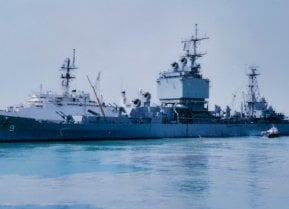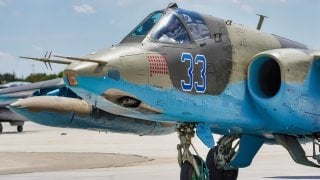Russia Is Creating Havoc in Africa
Africa, in particular, has been a battlefield for influence between Russia and the United States. Judging by the recent statements of Marine Corps Gen. Michael Langley, the head of U.S. Africa Command (AFRICOM), Russia is having some success.
Russia is embattled in a major conflict in Ukraine. Currently, the Russian military is on the offensive and is gaining ground. The Kremlin has poured billions of dollars and hundreds of thousands of troops into the conflict. The cost has been high.
As of March, Russian casualties range from 300,000 to 440,000 men killed, wounded, and captured, while the Russian military has lost tens of thousands of heavy weapon systems like tanks, infantry fighting vehicles, armored personnel carriers, and artillery pieces.
Although the Russian military’s heavy attrition means that its status as a conventional near-peer threat to the U.S. military is questionable, Russia overall continues to remain a strategic adversary to the United States, stirring up trouble around the world.
Africa, in particular, has been a battlefield for influence between Russia and the United States. Judging by the recent statements of Marine Corps Gen. Michael Langley, the head of U.S. Africa Command (AFRICOM), Russia is having some success.
Information Operations in Africa
If there is something that the Kremlin is good at, it has to be information operations. Dating all the way back to the tsars, Russia has been able to shape the information environment during peace and war through misinformation, disinformation, and propaganda.
In Africa, Russia has been using misinformation to turn African countries hostile to the United States and the West. In Niger, for example, Moscow succeeded through information operations to persuade the local government to oust U.S. forces from the country.
“The Russian Federation had their playbook. They had their passing game through their disinformation,” Gen. Langley told the lawmakers of the House Armed Services Committee in March.
Moscow often relegates its dirty jobs to private military companies like the infamous Wagner Group to retain some semblance of deniability.
The Importance of Africa
Why is Africa important, you might ask? For several reasons, including natural resources, geopolitical clout, and counterterrorism.
“Africa is big, and so are its challenges. There is high potential for strategic-level national security threats to grow this year,” Langley said.
U.S. adversaries like Russia and China have a much easier time attempting to sway African politics. Through malicious, illegal, and immoral means, Moscow and Beijing are bringing corrupt African politicians to their side. On the other hand, the United States plays by the rulebook as has a much harder job trying to free African nations from the corrupt clutches of its adversaries.
“Africa’s critical minerals and maritime shipping lanes become more important to America’s technological and energy independence every day. Coups in West Africa have distracted local security forces from fighting [violent extremist organizations], giving branches of al-Qaeda and ISIS room to expand, modernize, and reconstitute capabilities to threaten the U.S. homeland. America’s fastest-growing partners for trade, space exploration, and scientific exchange are in Africa, and its young and fast-growing populations are the key to safeguarding the global rules-based order,” the head of AFRICOM added.
“USAFRICOM is shoulder-to-shoulder with our State Department and USAID colleagues to do America’s part in helping Africa address its challenges. If we fail in Africa, our strategic competitors will move in. If we succeed, so do the peoples of Africa,” Langley concluded.
About the Author
Stavros Atlamazoglou is a seasoned defense and national security journalist specializing in special operations. A Hellenic Army veteran (national service with the 575th Marine Battalion and Army HQ), he holds a BA from the Johns Hopkins University, an MA from the Johns Hopkins’ School of Advanced International Studies (SAIS). He is pursuing a J.D. at Boston College Law School. His work has been featured in Business Insider, Sandboxx, and SOFREP.


